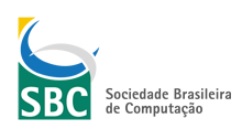Argumentation about Exchanges Values in Multiagent Systems and Collaborative Environments
Resumo
This article shows how dialogue protocols can be used to support argumentation about the exchange values that may be involved in interactions that occur between agents, human or artificial. In consequence, the agents become able to influence each other’s assignment of values to the results of interactions, and such valuative process becomes much more liable to be influenced by issues such as emotions and social power, which may arise between agents during their social lives.Referências
Almquist, P. (1992). Type of Service in the Internet Protocol Suite. RFC Editor, United States.
Amgoud, L. and Prade, H. (2005). Formal handling of threats and rewards in a negotiation dialogue. International Joint Conference on Autonomous Agents and Multiagent Systems, pages 529–536.
Cogan, E., Parsons, S., and McBurney, P. (2005). What kind of argument are we going to have today? International Joint Conference on Autonomous Agents and Multiagent Systems, pages 544–551.
Dimuro, G. P., Costa, A. C. R., Gonçalves, L. V., and Hübner, A. (2006). Regulating social exchanges between personality-based non-transparent agents. Mexican International Conference on Artificial Intelligence, 4293:1105–1115.
Dimuro, G. P., Costa, A. C. R., and Palazzo, L. A. M. (2005). Systems of exchange values as tools for multi-agent organizations. Journal of the Brazilian Computer Society, 11(1):31–50.
Franco, M. H. I. and Costa, A. C. R. (2007). Towards a protocol for negotiations about exchange values involved in multiagent interactions. Computational Models of Natural Argumentation, Workshop at IJCAI.
Kraus, S. (2001). Strategic Negotiation in Multiagent Environments. MIT Press: Cambridge, Massachusetts.
McBurney, P., Eijk, R. V., Parsons, S., and Amgoud, L. (2003). A dialogue game protocol for agent purchase negotiations. Journal of Autonomous Agents and Multi-Agent Systems, 7(3):235–273.
McBurney, P. and Parsons, S. (2002). Dialogue games in multi-agent systems.
Parsons, S., McBurney, P., and Wooldridge, M. (2005). Some Preliminary Steps Towards a Meta-theory for Formal Inter-agent Dialogues, volume 3366. Springer Berlin: Heidelberg.
Parsons, S., Wooldridge, M., and Amgoud, L. (2003a). On the outcomes of formal inter-agent dialogues. International Joint Conference on Autonomous Agents and Multiagent Systems, pages 616–623.
Parsons, S., Wooldridge, M., and Amgoud, L. (2003b). Properties and complexity of formal inter-agent dialogues. Journal of Logic and Computation, 13(3):347–376.
Piaget, J. (1995). Sociological Studies. Routlege, London.
Rahwan, I., Ramchurn, S., Jennings, N., McBurney, P., Parsons, S., and Sonenberg, L. (2004). Argumentation-based negotiation. The Knowledge Engineering Review, 18(4):343–375.
Ribeiro, M. R., Costa, A. C. R., and Bordini, R. H. (2003). A system of exchange values to support social interactions in artificial societies. International Joint Conference on Autonomous Agents and Multiagent Systems, pages 81–88.
Ribeiro, M. R. and Luck, M. (2006). Cooperative interactions: An exchange values model. Coordination, Organization, Institutions and Norms in Agent Systems, Workshop at ECAI.
Sierra, C., Jennings, N., Noriega, P., and Parsons, S. (1997). A framework for argumentation-based negotiation. International Workshop on Intelligent Agents, Agent Theories, Architectures and Languages, 1365:177–192.
Walton, D. N. and Krabbe, E. C. (1995). Commitment in Dialogue: Basic Concepts of Interpersonal Reasoning. Albany, State University of New York Press.
Amgoud, L. and Prade, H. (2005). Formal handling of threats and rewards in a negotiation dialogue. International Joint Conference on Autonomous Agents and Multiagent Systems, pages 529–536.
Cogan, E., Parsons, S., and McBurney, P. (2005). What kind of argument are we going to have today? International Joint Conference on Autonomous Agents and Multiagent Systems, pages 544–551.
Dimuro, G. P., Costa, A. C. R., Gonçalves, L. V., and Hübner, A. (2006). Regulating social exchanges between personality-based non-transparent agents. Mexican International Conference on Artificial Intelligence, 4293:1105–1115.
Dimuro, G. P., Costa, A. C. R., and Palazzo, L. A. M. (2005). Systems of exchange values as tools for multi-agent organizations. Journal of the Brazilian Computer Society, 11(1):31–50.
Franco, M. H. I. and Costa, A. C. R. (2007). Towards a protocol for negotiations about exchange values involved in multiagent interactions. Computational Models of Natural Argumentation, Workshop at IJCAI.
Kraus, S. (2001). Strategic Negotiation in Multiagent Environments. MIT Press: Cambridge, Massachusetts.
McBurney, P., Eijk, R. V., Parsons, S., and Amgoud, L. (2003). A dialogue game protocol for agent purchase negotiations. Journal of Autonomous Agents and Multi-Agent Systems, 7(3):235–273.
McBurney, P. and Parsons, S. (2002). Dialogue games in multi-agent systems.
Parsons, S., McBurney, P., and Wooldridge, M. (2005). Some Preliminary Steps Towards a Meta-theory for Formal Inter-agent Dialogues, volume 3366. Springer Berlin: Heidelberg.
Parsons, S., Wooldridge, M., and Amgoud, L. (2003a). On the outcomes of formal inter-agent dialogues. International Joint Conference on Autonomous Agents and Multiagent Systems, pages 616–623.
Parsons, S., Wooldridge, M., and Amgoud, L. (2003b). Properties and complexity of formal inter-agent dialogues. Journal of Logic and Computation, 13(3):347–376.
Piaget, J. (1995). Sociological Studies. Routlege, London.
Rahwan, I., Ramchurn, S., Jennings, N., McBurney, P., Parsons, S., and Sonenberg, L. (2004). Argumentation-based negotiation. The Knowledge Engineering Review, 18(4):343–375.
Ribeiro, M. R., Costa, A. C. R., and Bordini, R. H. (2003). A system of exchange values to support social interactions in artificial societies. International Joint Conference on Autonomous Agents and Multiagent Systems, pages 81–88.
Ribeiro, M. R. and Luck, M. (2006). Cooperative interactions: An exchange values model. Coordination, Organization, Institutions and Norms in Agent Systems, Workshop at ECAI.
Sierra, C., Jennings, N., Noriega, P., and Parsons, S. (1997). A framework for argumentation-based negotiation. International Workshop on Intelligent Agents, Agent Theories, Architectures and Languages, 1365:177–192.
Walton, D. N. and Krabbe, E. C. (1995). Commitment in Dialogue: Basic Concepts of Interpersonal Reasoning. Albany, State University of New York Press.
Publicado
16/04/2007
Como Citar
FRANCO, Márcia Häfele Islabão; COSTA, Antônio Carlos da Rocha.
Argumentation about Exchanges Values in Multiagent Systems and Collaborative Environments. In: WORKSHOP-ESCOLA DE SISTEMAS DE AGENTES, SEUS AMBIENTES E APLICAÇÕES (WESAAC), 1. , 2007, Pelotas/RS.
Anais [...].
Porto Alegre: Sociedade Brasileira de Computação,
2007
.
p. 28-38.
ISSN 2326-5434.
DOI: https://doi.org/10.5753/wesaac.2007.33032.



